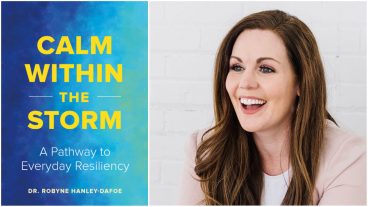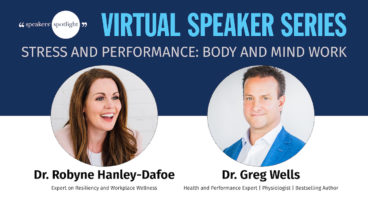We can’t escape stress. It’s a natural part of life, and we are hard-wired to experience it. But, today more than ever, it’s crucial we learn how to stress wisely in order to counteract the second pandemic sweeping the nation — burnout and compassion fatigue.
In a recent paper, resiliency expert Dr. Robyne Hanley-Dafoe explores chronic stress and its impact on people during times of uncertainty.
While we know what stress feels like in the moment — a pounding heart; short, rapid breathing; sweaty palms, etc. — we are not good at feeling or seeing the slow, steady build-up of stress that can lead to real damage in our lives, Robyne writes.
As a result, many of us today are feeling “done”. These feelings can be reversed though, Robyne says, by learning how to stress wisely. It starts with understanding why and how you’ve reached this point, then establishing your values and playing to your signature strengths.
Understanding Your Stress
Robyne outlined a five-step activity to help people learn about their personal stress patterns and behaviours.
Step 1: Understand how you stress — Look at how stress shows up in your life, and examine how your thoughts and actions differ during those times.
Step 2: Identify your sources of stress — Where does your stress come from? Make a list and name those sources.
Step 3: Develop self-awareness of your own stress signals and your go-to responses — What does your stress behaviour look like? What does your coping strategies look like? Are there patterns?
Step 4: Identify how you would like to respond to stress — In an ideal world, how would you like to behave when stressed? Is there someone who models stress responses well that you could learn from?
Step 5: Make your own stress playbook — Take your list of stress sources, and one by one map out how you would like to cope with them.
Breaking stress down into these smaller focus points can help make it seem more manageable.
Identifying and Committing to Your Values
Too much chronic stress leads to burnout. This is why learning to stress wisely is so important to our well-being. The symptoms of burnout are quite similar to stress, but exasperated by emotional exhaustion, cynicism, and personal inefficacy.
When you recognize that you are experiencing burnout, Robyne says, you must STOP doing what you’re doing and PRIORITIZE active recovery immediately. The first step is to rest. You need active brain recovery, Robyne says, through sleep, self-care, and a total reset.
The next step is to re-evaluate how you are living. Burnout is often caused from the stress of living outside of your values, Robyne says. For example, you may value collaboration and community, but you’ve spent the last year working in a silo. Without the community of your colleagues, your work has become heavy and unfulfilling.
Spend time evaluating what your true values are, Robyne says. Look at how you may have deviated from them this past year and map out ways in which you can try to make your way back to them.
Playing to Your Strengths
The next frontier of distress and burnout is compassion fatigue — the depletion of feeling another person’s pain. Those experiencing this are numb, less able to display empathy, and have lost hope in their ability to help others. Prior to the pandemic, this was often a condition of caregivers, nurses, soldiers, etc., Robyne writes, but today we’re seeing it in non-traditional industries as well.
It’s known as the cost of caring and is the root of the “I’m done” feeling. As a result, people are more likely to snap at others and engage in self-destructive behaviours. There is a correlation between compassion fatigue and self-neglect, Robyne writes. When you stop practicing empathy for yourself, you actually stop showing empathy to others.
Robyne says we can combat this through following the three principles to stressing wisely.
1) Signature Strengths
Use what you’ve got. Signature strengths are essential, effortless, and energizing. Through leveraging them, Robyne writes, we can navigate daily stressors sustainably. Examples include self-control, social intelligence, gratitude, hope, leadership, forgiveness, kindness, etc.
Identify what your signature strengths are, and reflect on how you can use them when responding to stress.
2) Boundaries
Boundaries are the furthest limits to how much you can handle. They don’t exist to keep people out but to protect your peace.
“Each time you set and hold a personal boundary,” Robyne writes, “you are affirming that you matter and you have the right to make choices that are best for you and your loved ones.”
It may feel strange to set boundaries at first, Robyne says, but with practice it will be easier. To begin, start by asking yourself, will saying yes to this request enhance or hinder my day?
3) Feelings Before Behaviours
This is the game changer, Robyne says. Think about how you want to feel, then find the behaviour that helps you feel this. This is true self-care.
For example, if you want to feel affectionate, spend time with a loved, play with a pet, or read or watch a love story. If you want to feel focused, write a to-do list. If you want to feel energized, get outside for your dose of “vitamin nature”. The possibilities are endless, Robyne writes. Choose how you want to feel and do whatever helps you feel it.
By understanding your stress and how to specifically respond to it in a way that plays to your strengths and lives within your values, you will build confidence into how you respond and push through challenging times. You can do hard things, Robyne says. “Rest but do not quit. The world needs you.”
Read more from Robyne in her white paper, Stress, Burnout, and Compassion Fatigue During Seasons of Uncertainty.
Described as one of the most sought-after, engaging, and thought-provoking keynote speakers, Dr. Robyne Hanley-Dafoe is a multi-award-winning psychology and education instructor. Her keynotes provide practical strategies, grounded in global research and case studies, that help foster resiliency within ourselves and others.
Interested in learning more about Robyne and what she can bring to your next event? Email us at [email protected].




